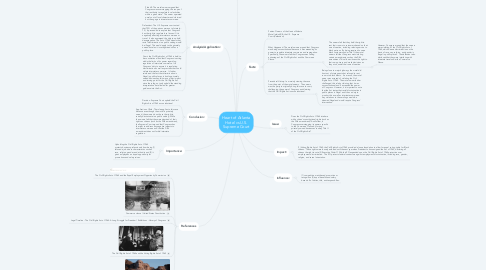
1. Rule of Law:
1.1. The Civil Rights act of 1964 allows for the U.S. Supreme Court to rule against any employment and/or public place discrimination on the basis of race (specific to this case), gender, sex, and religion. The additional principle to the Commerce Clause that was added in 1824 allowed Congress to regulated interstate commerce. This was a direct impact from the Gibbons vs Ogden case.
2. Analysis/Application:
2.1. Plaintiff: The motel owners argued that Congress was overstepping the scope of their authority to regulate local activities within a given state. The owner operated purely out of local character and claimed not to engage in interstate commerce.
2.2. Defendant: The U.S. Supreme court noted that 75% of the patrons were out of state (p. 73). It proceeded to explain that Congress has the right to regulate local issues if it is negatively effecting interstate commerce or travel. It also expressed the duty to uphold desegregation. The Act of 1964 deems that racial discrimination in a public setting would be illegal. This would apply to the privately owned hotel as it is categorized still as a public place.
2.3. Court: the Civil Rights Act of 1964 is held to be constitutional and that Congress is acting within the limits of its power regarding regulation of interstate commerce. It is Congress' duty to ensure it is regulating discrimination as well as practices that could violate interstate commerce. It further reinforced the fact that discrimination is illegal in public places, including privately owned businesses; this was a major impact and turning point for the Civil Rights Act since the ruling not only upheld the standing interpretation but allowed for greater guidance into the Act. .
3. Conclusion:
3.1. Decision: Supreme Court upheld the Civil Rights Act of 1964 as constitutional
3.2. Application of Rule: The rule applies to this case because even though the motel is privately owned, the owners do not have the right to racially discriminate in a public setting. While the owners felt that they were deprived of their rights as citizens (such as the Fifth amendment), the Supreme Court argued that Congress has the right to address any negative impacts to interstate commerce and that the Fifth amendment does not forbid interstate regulation.
4. Importance:
4.1. Upholding the Civil Rights Act of 1964 protects business professionals from being (1) refused a job due to characteristics such as race, religion, gender, and ethnicity and (2) it gives employees an equal opportunity for promotions and salary raises.
5. References
5.1. The Civil Rights Act of 1964 and the Equal Employment Opportunity Commission
5.2. Commerce clause | United States Constitution
5.3. Legal Timeline - The Civil Rights Act of 1964: A Long Struggle for Freedom | Exhibitions - Library of Congress
5.4. The Civil Rights Act of 1964 and the Voting Rights Act of 1965
5.5. What Is Executive Order 11246?
6. Facts:
6.1. Parties: Owners of the Heart of Atlanta Motel (plaintiff) & the U.S. Supreme Court (defendant)
6.2. What Happened: The motel owners argued that Congress was being unconstitutional because it was exceeding its power to regulate interstate commerce and segregation. Specifically, the owners felt that Congress was taking advantage of the Civil Rights Act and the Commerce Clause.
6.2.1. The owners felt that they held the right to rent their rooms to customers based on their own discretion, including refusing service to black patrons. By being required to serve black customers under Title II, the motel owners felt that Congress was violating certain amendments such as the Fifth amendment. This allows citizens the right to their own privacy and make decisions as they wish, under their own discretion.
6.2.1.1. However, Congress argued that the owners were violating of the Civil Rights Act of 1964, which deems discrimination on the basis of race, sex, religion, and gender is illegal in public places. The defendant also disclosed that they were interfering with interstate travel under the Commerce Clause.
6.3. Procedural History: I am mainly viewing the case from the point of the motel owners. The owners was the party to originally bring this case to court, challenging the power of Congress and claiming that the Civil Rights Act is unconstitutional.
6.3.1. Being close to major highways, the motel did host out of state guests but refused to rent rooms to black clients. As a result, the motel owner was accused of violating the Civil Rights Act of 1964. The motel owner further challenged this rule by claiming that it was unconstitutional and it exceeded the power of Congress. However, it is important to note that the Act states that racial discrimination in public places is illegal and it has a duty to monitor this as well as interstate commerce. Any violations to these rulings would be deemed illegal and would require Congress' intervention.

